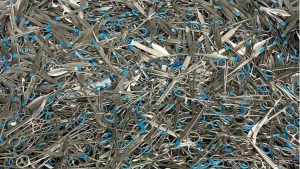Disposable versus reusable: have we gone too far?
Else de Ridder (Green Care Academy) · · 4 min readNowadays, we live in a throw-away culture. In our daily life we use a lot of disposable products: coffee cups, water bottles, take-out containers. How many disposable products have you used today?
The medical industry is following this trend. A large part of medical products are disposable. This is a trend that has been rising for a number of years now. Some disposables have dramatically improved the quality of our care. We cannot imagine having to use reusable gauzes or needles in the OR. But for some products, such as a scissor or a bowl, is a disposable one really necessary?
In this blogpost, I debunk some myths around reusables versus disposables with Omayra Nooitgedagt, policy advisor sustainability at Medisch Centrum Leeuwarden.
But washing a reusable also costs water and energy
This is always the first argument I hear in favour of disposable products. It seems logical: you use the product and you throw it away, simple. No other processes like washing or sterilisation needed. However, the process of making a product costs far more energy - and water - than washing it. This seems counterintuitive, but multiple researchers have shown this.
We have switched some disposable products to reusables over the past few years. Furthermore, we have the procurement policy: “Reusable, unless…”. By making reusable the default option, we contribute to more sustainable healthcare. For some products, we calculated the difference in CO2-footprint between a reusable and disposable. This was always in favour of the reusable. We also do this for the business case. This is very important, as a sustainable hospital should also be financially healthy.
– Omayra Nooitgedagt
But disposables are more hygienic
Quality of care always precedes sustainability. This means that the washing and sterilisation process need to be suitable for the reusable. You can check this with your sterilisation department. Nevertheless, when done right, reusables and disposables result in equal infection rates for most procedures.
Reusables need a more controlled process than disposables. For reusables, you need to ensure the sterilisation process has been successful, track and trace from and towards the sterilisation department, et cetera. Quality and safety are always more important than sustainability.
– Omayra Nooitgedagt
Have we gone too far?

In my opinion, yes. Disposables have helped to get the quality of care to the current level. But not all disposables contributed to this. A scissor that is used to cut a clean bandage does not need to be thrown out after one snip. The environmental savings when switching from a disposable to a reusable are the most substantial when this is done for a metal disposable. So next time you use a metal disposable, I challenge you to imagine if this disposable could be switched to a reusable. The next step is to sit down with procurement to discuss the possibilities.
The sustainable choice is often the choice that makes the most sense. We all know creating excessive amounts of waste is not sustainable. Disposables are a large part of medical waste. Preventing this by switching to a reusable product is a logical and sustainable choice. I would advise you to incorporate this in the policy of your hospital. When you have the backing of the Board of Directors, you do not need to have the discussion every time.
– Omayra Nooitgedagt
Do you want to start greening your operating room today? We've listed 10 concrete steps to make your operating room more sustainable.
Besides, if you want to learn more about switching from disposable to reusable, watch the webinar “reuse” with Dr. Hugo Touw on Green Care Academy’s YouTube channel.
This blogpost was created in collaboration with Green Care Academy.







